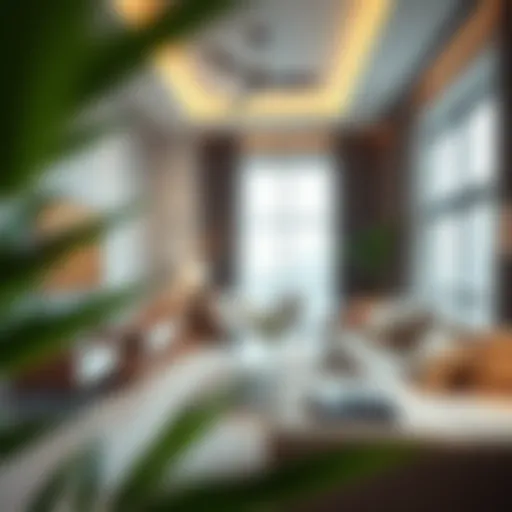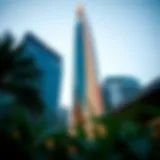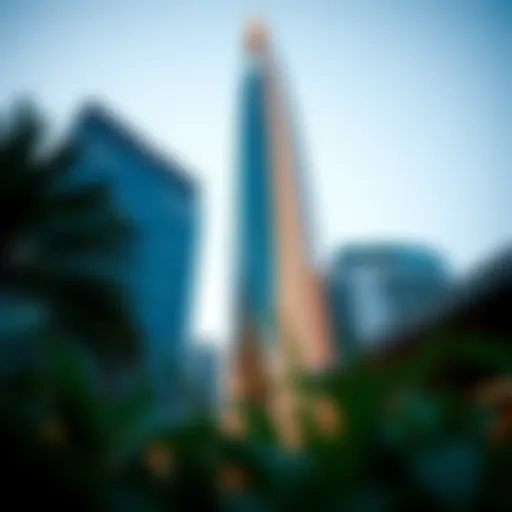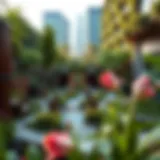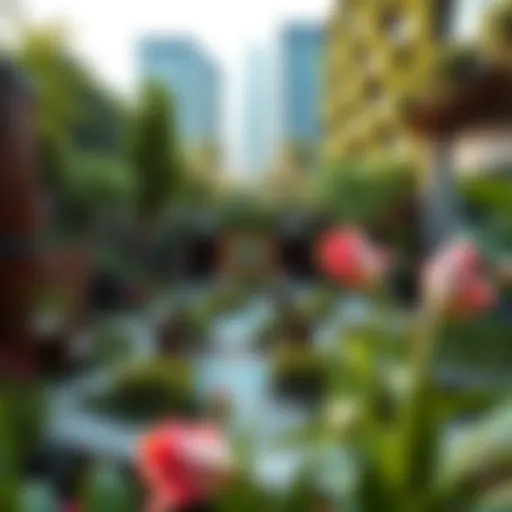Exploring Daily Life and Culture in Dubai
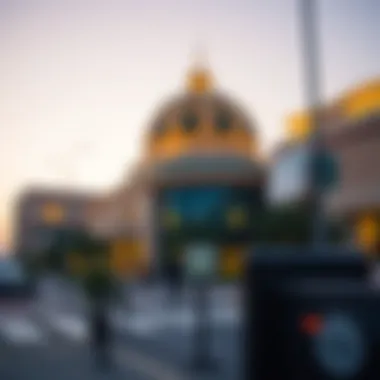

Intro
Dubai, a city that has risen like a phoenix out of arid desert land, serves as a beacon for those seeking opportunity and adventure. The daily rhythm here is a intricate dance of cultures, where East meets West in a symphony of sights, sounds, and tastes. Life in Dubai is a tapestry woven with threads of luxury, diversity, and innovation, appealing not only to its residents but also to a growing number of investors looking to capitalize on its tremendous economic potential.
In this guide, we will journey through the many layers of daily life in this dynamic city, from the hustle and bustle of the markets to the serene luxury of high-rise living.
Understanding the nuances of daily life requires a careful look at the following aspects:
- The buzzing economic climate and market trends
- The diverse and vibrant neighborhoods that define the community
- Insights into the types of properties available for living or investment
By exploring these components, we aim to equip our readers—be it investors, homebuyers, agents, or managers—with the comprehensive knowledge needed to navigate this alluring maze of opportunities
Understanding the Urban Landscape
Dubai's urban landscape serves as the bones and muscles of its vibrant daily life. It’s not just about glass towers and sprawling malls; it’s about how these structures intertwine with the everyday lives of the people living and working here. Comprehending this landscape allows investors, homebuyers, and residents to grasp the essence of what makes this city tick.
The infrastructure in Dubai effectively supports its growing population and booming economy. This is a city that began as a modest fishing and trade hub and has morphed into a global powerhouse. Understanding the nuances of the urban layout can help potential residents identify suitable neighborhoods that align with their lifestyle aspirations and investment goals. The following subsections offer a closer look at the city's infrastructure and key neighborhoods, both of which are essential to navigating the distinct characteristics of Dubai.
Overview of Dubai's Infrastructure
Dubai's infrastructure is nothing short of impressive. The city boasts an extensive road network, high-speed metro systems, and state-of-the-art airports. The blend of modern technology and innovative design reflects the city's ambition and ethos.
- Roads and Highways: The road systems are well-maintained and cover a large expanse, allowing for smooth traffic flow despite the high density of vehicles. Major highways like Sheikh Zayed Road act as arteries, connecting key economic zones and residential areas.
- Public Transport: Dubai Metro stands out as a symbol of modern transport. It offers a convenient, efficient way to traverse the city, easing the daily grind, especially for those who prefer not to be behind the wheel. Additionally, the tram system in Dubai Marina and extensive bus networks add layers to the public transport options available.
This intricate infrastructure not only facilitates movement but also attracts businesses, contributing to an economically dynamic setting. People relocating to the city can assess this infrastructure when making housing decisions.
Key Neighborhoods and Their Distinctions
Understanding the unique characteristics of Dubai's neighborhoods is crucial for those looking to immerse themselves in local culture or find the ideal place to call home.
Downtown Dubai
Downtown Dubai stands as a beacon of modernity. It’s home to the iconic Burj Khalifa and the expansive Dubai Mall, making it a focal point for tourism and commerce. Living here means being at the heart of the action, surrounded by breathtaking views and a plethora of entertainment options.
- Key Characteristic: The blend of skyscrapers and lush green spaces offers a unique urban experience.
- Why It’s Beneficial: It’s a hotspot for both locals and tourists, making it an attractive area for high rental yields and potential capital appreciation.
- Unique Feature: The Dubai Fountain in the Burj Khalifa Lake is a sight that enchants both residents and visitors nightly. This feature emphasizes the area’s commitment to lavish lifestyle and cultural richness.
However, the premium prices can be a downside, especially for those on a tighter budget, complicating the decision for potential renters and buyers.
Dubai Marina
Dubai Marina is like a microcosm of luxury. As one of the most vibrant waterfronts, it combines leisure and living in ways that thrill its residents. With numerous dining options and a stunning promenade, it draws a younger crowd, particularly expatriates enticed by its lively environment.
- Key Characteristic: The canals and artificial lagoons create a serene atmosphere juxtaposed with high-rise apartments.
- Why It’s Beneficial: The area is fantastic for socializing and networking, providing a rich scene for both work and leisure.
- Unique Feature: The Marina Walk, lined with restaurants and shops, serves as the heart of the neighborhood, allowing community interaction while enjoying the waterfront.
Nevertheless, the bustling atmosphere may not suit everyone and can deter those seeking tranquility away from the hustle and bustle of city life.
Jumeirah
Jumeirah is synonymous with luxury and beachside living. Known for its picturesque views and upscale properties, it has long been a prime location for families and high-profile individuals. The pristine beaches set the stage for an opulent lifestyle.
- Key Characteristic: The area is primarily residential but also showcases luxury hotels and exclusive beach clubs.
- Why It’s Beneficial: Its family-friendly environment, combined with close proximity to elite schools and healthcare facilities, makes it popular among expatriates raising families.
- Unique Feature: The iconic Burj Al Arab hotel is not just a landmark but represents a lifestyle of affluence that defines Jumeirah.
That said, potential downsizing buyers may find the high property prices and value fluctuations here to be a barrier, making careful consideration essential.
Navigating through Dubai's urban environment means engaging with not only the physical structures but also the community dynamics they foster. Understanding where these neighborhoods fit within the cityscape is crucial for making informed investment and lifestyle decisions.
Cultural Influences on Daily Interactions
Understanding the cultural influences on daily interactions in Dubai is crucial for anyone—be it residents, visitors, or potential investors—looking to navigate the social fabric of this cosmopolitan city. The very essence of Dubai is shaped by its rich array of cultures and traditions that coexist. When you stroll through the streets or engage in business meetings, you're not just interacting with a singular culture; you’re navigating a rich tapestry woven from many traditions. This influence can lead to a richer experience in social and business engagements, fostering an environment ripe for collaboration and partnership.
Diverse Populations and Their Contributions
Dubai is often likened to a melting pot. The city boasts a diverse population comprising over 200 nationalities, each contributing their unique cultural flavors. This blend creates a vibrant atmosphere, enriching day-to-day interactions while presenting a myriad of perspectives. For instance, expatriates from India often bring their robust community ties, while Westerners might emphasize direct communication styles. These diverse influences result in a more dynamic social environment, where understanding and adaptation are essential.
Benefits of Diversity:
- Enhanced Creativity: Different cultural viewpoints encourage innovative thinking.
- Broadened Perspectives: Exposure to varied customs and practices can deepen one’s understanding of global business practices.
- Stronger Networks: Diverse backgrounds often result in unique connections that can open doors in both personal and professional realms.
When you attend a business meeting in Dubai, it's not uncommon to find a mix of formal and informal interactions. While some cultures may prioritize strict protocols, others may lean towards a more relaxed approach—understanding this blend is key to effective communication.
Cultural Events and Their Significance
Cultural events in Dubai serve as vital loci of interaction—from art exhibitions to traditional festivals. They offer platforms for showcasing food, art, and music, all of which speak volumes about the city's diverse makeup. Not only do these events enhance community bonds, but they also provide opportunities for networking and business collaborations.
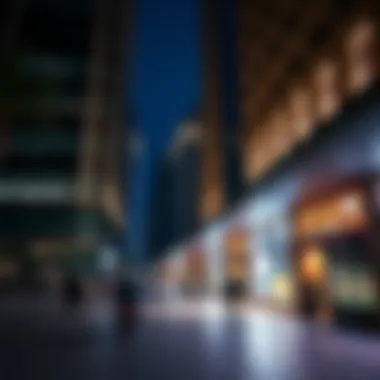

Some notable events include:
- Dubai Shopping Festival: Celebrated annually, this event is a major attraction that brings together vendors, consumers, and tourists alike.
- Art Dubai: Functioning as a hub for creativity, this fair showcases local and international art galleries, promoting cultural dialogue and appreciation.
- Eid Celebrations: These are marked by family gatherings and festivities that offer a glimpse into the rich Islamic traditions that form a core part of Dubai's identity.
Cultural events foster a sense of community and promote a deeper understanding of the various customs that shape daily interactions in the city.
Professional Life and Market Trends
In the bustling heart of Dubai, professional life and market trends are ever-evolving, reflecting the city's ambitious goals and global aspirations. This section dives deep into what makes Dubai not just a hub of culture but also a powerhouse for businesses, attracting talent and investment from across the globe. Bridging East and West, Dubai harnesses opportunities and challenges unique to its environment, making it crucial for anyone looking to make a mark in this vibrant city.
Dubai as a Business Hub
Dubai stands as a beacon for entrepreneurs, multi-nationals, and professionals. The city brims with a dynamic business climate bolstered by tax benefits, strategic geographic location, and modern infrastructure. A key selling point is the absence of personal income tax, which makes it an attractive prospect for high-earning professionals and entrepreneurs alike.
The free zones scattered across the emirate offer further incentives, allowing 100% foreign ownership and full repatriation of profits. These zones cater to various sectors, including tech, finance, and media, encouraging innovation and partnership.
Furthermore, regular international events like the Arabian Travel Market and GITEX Technology Week foster networking, providing platforms for professionals to forge connections and explore market trends.
Industry growth isn’t just a pipedream here; it’s a result of calculated strategies and a collective vision toward becoming a global business hub.
Emerging Industries and Opportunities
As Dubai moves forward, it is essential to keep an eye on the emerging industries that are reshaping its economic landscape. With a proactive government encouraging the growth of various sectors, several opportunities arise for investors and professionals.
Technology
The role of technology in Dubai’s business landscape cannot be overemphasized. From blockchain initiatives in real estate to artificial intelligence driving smarter public services, the tech industry stands at the forefront of the UAE’s vision for the future. Particularly, the Dubai Smart City initiative aims to harness technology for sustainable urban living, enhancing quality of life for residents.
Moreover, Dubai's investment in 5G technology paves the way for further digital innovations transcending traditional industries.
- Key Characteristic: A culture of innovation and support for start-ups.
- Advantages: This leads to an influx of talent and creativity, making the tech sector highly engaging and lucrative.
- Disadvantages: Rapid technological shifts might pose challenges for businesses keeping pace with constant change.
Tourism
Tourism continues to be a pillar of Dubai's economy. Known for luxurious attractions and a unique blend of cultures, the emirate garners millions of visitors each year.
- Key Characteristic: A stunning array of experiences, from the towering Burj Khalifa to tranquil beaches and desert adventures.
- Advantages: Tourism supports local businesses and generates significant employment opportunities.
- Disadvantages: Over-reliance on tourism might leave the economy vulnerable to global economic fluctuations.
Retail
Retail is yet another sector witnessing unprecedented growth in Dubai. The city’s shopping malls, such as The Dubai Mall and Mall of the Emirates, attract shoppers from around the world. Promotions during the shopping festival periods lead to increased foot traffic and sales.
- Key Characteristic: Retail in Dubai is not just transaction-based, but an experience-driven ecosystem.
- Advantages: The allure of luxury brands provides a unique market opportunity, benefiting both large retailers and local artisans alike.
- Disadvantages: The shift towards online shopping could challenge traditional retail methods.
As Dubai continuously adapts to shifting global trends, being aware of these emerging industries offers profound opportunities for growth and investment.
Real Estate Considerations
Understanding the real estate market in Dubai is crucial for anyone looking to navigate daily life in this vibrant city. The real estate sector not only shapes the physical landscape but also influences the economy, lifestyle, and even cultural interactions. As an investor or potential homebuyer, knowing about the intricacies of this market can enhance your decision-making.
Current Market Overview
Dubai's real estate market has faced fluctuations, influenced by various global economic factors, local laws, and burgeoning population demands. Currently, the market shows resilience, evidenced by ongoing high investment levels and a growing appetite for luxury and affordable housing alike. According to a recent report, property prices in some sectors have stabilized, with a notable increase in transaction volumes for certain property types. This provides a clearer picture for investors considering both short-term gains and long-term investments.
"Dubai's real estate market is not just about buying and selling; it’s about being part of a lifestyle that transcends borders."
Types of Properties Available
Dubai offers a diverse range of properties, each catering to different lifestyles and investment goals. Understanding these options can help one make the most informed choice.
Luxury Apartments
Luxury apartments in Dubai shine as some of the most sought-after real estate. Designed with opulence in mind, these properties often feature top-notch amenities, including swimming pools, gyms, and concierge services. Their attractiveness is not just about luxury; it’s also about location. Many are found in high-demand locales like the Downtown area or near the Marina.
While they can be expensive, the potential for rental yields remains significant due to a steady influx of both tourists and expatriates seeking short-term housing. However, potential buyers also need to consider maintenance costs, which can be high.
Villas
Villas in Dubai provide a more spacious option, ideal for families looking to settle down. Many of these properties are located in gated communities, which offer added security and comfort. A key feature of villas is their outdoor space, which is often hard to come by in apartment living.
Although the initial investment might be steep, the long-term value tends to appreciate, making it a solid choice for families and investors alike. However, it’s important to account for the upkeep that comes with larger spaces, not to mention common fees associated with development divisions that may affect overall expenses.
Commercial Spaces
Commercial spaces represent a different realm of opportunities within Dubai's real estate environment. This includes offices, retail units, and even industrial spaces. The commercial market is driven by various sectors like technology and tourism, and the bustling economy makes it an appealing option for investors.
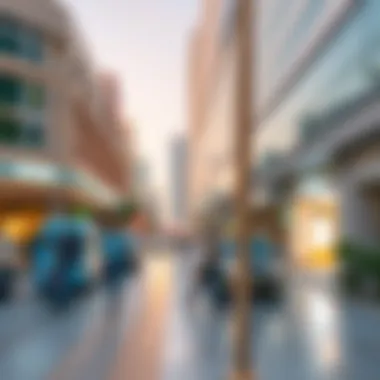

These properties can provide excellent returns, especially in well-located areas or popular shopping districts. Yet, there are considerations such as lease durations and tenant stability, which can fluctuate based on economic conditions. Understanding the trends in this sector can be as crucial as knowing the resident market.
Financing and Investment Options
When it comes to financing, potential buyers in Dubai have various options. Mortgages are common, especially for expatriates, with banks offering competitive rates. There are also government-backed initiatives designed to motivate investments, particularly in affordable housing. So, whether you are considering buying your first home or expanding an investment portfolio, it would be wise to explore both local banks and international financial institutions for the best financing solutions.
Daily Commutes and Transportation Networks
Daily commutes in Dubai offer a glimpse into the rhythm of life in this bustling city. An efficient transportation network serves as the backbone for its residents, shaping how people navigate through work, study, and leisure. Understanding the nuances of public and private transport in Dubai is fundamental for both newcomers and long-term residents. It highlights not only the practical aspects of daily life but also the cultural inklings that shape movement across this urban landscape.
Public Transport Systems
Dubai boasts a comprehensive public transport system that stands out for its efficiency and cleanliness. The Dubai Metro is a notable feature, connecting key areas of the city from the bustling Downtown to the energetic Dubai Marina. With its air-conditioned cabins and punctual schedules, the Metro offers a smooth travel experience, catering to the fast-paced lifestyle many lead.
Moreover, buses and water taxis add layers of convenience. Buses cover extensive routes, ensuring even the less-trafficked parts of the city are accessible. Meanwhile, the abra boats on Dubai Creek provide a unique perspective of the city while offering an authentic flavor of local culture.
These public transport options not only serve a practical purpose but also promote social interactions among diverse populations, reinforcing Dubai’s ethos of hospitality and multiculturalism. Despite the occasional rush-hour clusters, the overall infrastructure supports an impressive volume of travelers seamlessly.
Private Transportation Options
When it comes to private transportation, residents in Dubai have two standout options: ride-sharing services and personal vehicles. Both options come with their own specific elements, benefits, and certain considerations.
Ride-Sharing Services
Ride-sharing services like Uber and Careem have reshaped how people in Dubai travel. They provide a viable alternative to traditional taxis, often making rides more affordable and convenient. With just a few taps on a smartphone app, one can summon a ride tailored to their destination. The flexibility to choose from different vehicle types—be it a budget ride or a premium service—is a unique feature that caters to various needs.
"The rise of ride-sharing options in Dubai has unveiled a new chapter in commuting, blending modern convenience with local charm."
The advantages of ride-sharing include fare transparency and the ability to track the ride in real-time, which enhances safety. However, during peak hours, these services might experience delays, particularly in high-traffic areas. Additionally, surge pricing during busy times can put a dent in the budget, making it something to consider for regular commuters.
Personal Vehicles
Owning a personal vehicle is another popular alternative for many Dubai residents. The city's layout, heavily favoring car travel with wide roads and suburban developments, encourages this lifestyle. The luxury of having a car makes traveling around more flexible, especially when accessing areas that are less well-served by public transport.
However, having a car also means managing fuel costs and navigating the traffic congestion that can occur during rush hours. The comfort of personal vehicles often comes with the responsibility of parking, which can sometimes be an issue in more crowded areas.
In summary, while public transport offers accessibility and ease, private options provide flexibility and autonomy. Each mode of transport suits different lifestyles and needs, impacting how people experience and traverse everyday life in Dubai.
Dining and Lifestyle Experiences
The dining and lifestyle experiences in Dubai are not merely auxiliary aspects of everyday living; they form a vital part of the city's cultural and social fabric. Understanding these experiences helps to appreciate the rich blend of tradition and modernity that characterizes Dubai. As this city evolves, it continues to attract a mosaic of cultures, all of which find expression in various culinary offerings and leisure activities. For investors and potential residents, knowing about these aspects can aid in grasping the social dynamics that influence housing demand and demographic patterns.
Culinary Landscape of Dubai
Dubai’s culinary landscape is nothing short of a feast for the senses. It offers a remarkable fusion of flavors drawing from the Middle Eastern heartland as well as international cuisine. From street vendors to high-end dining establishments, the options are as vast as they are diverse.
Visitors can explore vibrant food markets like the Dubai Spice Souk, where aromatic spices create an intoxicating atmosphere. Furthermore, upscale dining locations such as the At.mosphere in the Burj Khalifa provide a breathtaking view alongside gourmet meals. Each dining experience is unique, highlighting not just food but the cultural stories behind each dish.
In addition, Dubai's emphasis on gastronomy makes it a prominent location for food festivals and culinary events. Such occasions offer food lovers a chance to engage with chefs and through tasting menus, enhance their understanding of both traditional and contemporary culinary arts. This variety not only elevates the dining experience but also influences the lifestyle choices of residents, who often gravitate towards places that reflect their multicultural experience.
Social Venues and Entertainment Options
Social venues and entertainment options play a pivotal role in Dubai’s lifestyle dynamics, offering residents a plethora of choices to unwind and connect.
Malls and Shopping
Dubai is renowned for its lavish shopping malls that go beyond mere retail spaces. The Dubai Mall, one of the largest in the world, is a wonderful blend of attractions. It features an indoor ice rink, an aquarium, and even a theme park. Shopping here is an experience, where consumers aren't just purchasing goods but are engaging in a holistic lifestyle.
These malls also serve as community spaces, hosting events, art exhibitions, and festivals, which foster a sense of belonging among expats and nationals alike. While the advantages of shopping in such grand venues are immense, some argue that they could overshadow smaller, local businesses, posing challenges for traditional marketplaces in Dubai.
Nightlife and Social Gatherings
The nightlife in Dubai is vibrant, offering various social gatherings that cater to a wide array of tastes—from upmarket lounges in Downtown to laid-back beach clubs in Jumeirah. The city's nightlife scene attracts locals and tourists seeking entertainment ranging from live music to DJ performances. Each venue often tells a story of its own, inviting guests to engage and socialize while enjoying unconventional experiences.
These social gatherings are not just for leisure but also present networking opportunities, crucial for professionals looking to expand their business connections. However, it’s important to note that while the nightlife thrives, it must align with local customs and regulations, keeping the social atmosphere in harmony with cultural values.
"Dubai’s dining and nightlife exemplify its cosmopolitan spirit—where east meets west, tradition intertwines with modernity."
In summation, the dining and lifestyle experiences in Dubai serve as a barometer for understanding the city’s continual evolution. The blend of culinary diversity, expansive shopping options, and dynamic social venues contribute significantly to the overall quality of life, making it an attractive destination for both potential investors and those looking to settle.
As you delve deeper into this locale's offerings, consider how these experiences shape community interactions and the inherent lifestyle of this dazzling city.
Education and Community Services
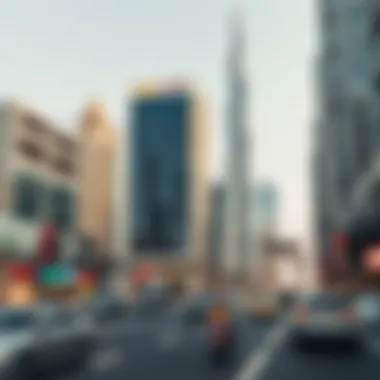

In Dubai, education and community services are vital pillars that shape the experience of both residents and expatriates. A strong educational framework not only ensures that children receive a robust foundation but also contributes to the overall well-being of families choosing this vibrant metropolis. Understanding the array of educational options and the available community services can enhance life in this city, making it an attractive destination for families and investors alike.
International Schools and Curriculum
Dubai is renowned for its diverse international schools that cater to a plethora of expatriate communities. These institutions often offer varying curricula like British, American, Indian, and IB (International Baccalaureate), allowing families to select an education model that aligns with their cultural values and future aspirations for their children.
The schools in Dubai are recognized for their high academic standards and afford students the opportunity to engage in a well-rounded education that emphasizes critical thinking and creativity. Not only are the facilities often equipped with state-of-the-art technology, but they also provide a vast array of extracurricular activities, ranging from sports to the arts.
The choice of school can significantly influence a family’s decision to relocate or invest in Dubai, making it essential to evaluate educational offerings thoroughly.
Here’s an overview of notable points regarding international schools in Dubai:
- Accreditation: Many schools in Dubai are accredited by international educational bodies, ensuring they meet global standards.
- Cultural Diversity: Classrooms often reflect a mix of nationalities, helping children develop global perspectives and intercultural skills.
- Language Options: Language of instruction varies, with English typically being the dominant language, but various schools also teach in Arabic and others, catering to the linguistic preferences of families.
Healthcare Facilities and Their Standards
Evaluating healthcare services is crucial for anyone considering a move to Dubai. The city boasts a vast network of healthcare facilities, including private hospitals, clinics, and government-funded institutions, most of which meet or surpass international standards of care.
Dubai is home to both public and private healthcare options, with the latter often offering quicker access to specialists and advanced treatments. Some key considerations regarding healthcare facilities include:
- Quality of Care: Hospitals like Mediclinic City Hospital and Rashid Hospital consistently receive high marks for patient care and advanced medical technologies.
- Insurance Requirements: Many expatriates obtain private health insurance as this is often required to access various services, particularly in private facilities.
- Accessibility: The city’s healthcare facilities are well-distributed, making them accessible regardless of where one lives. Moreover, many hospitals offer multilingual staff, easing communication for non-native speakers.
Legal Framework and Expat Regulations
Understanding the Legal Framework and Expat Regulations in Dubai is crucial for anyone looking to settle down or invest in this bustling metropolis. With a rapidly expanding economy and a melting pot of cultures, Dubai offers a unique environment for expatriates. The legal landscape helps define rights and responsibilities, ensuring that both locals and foreign residents can co-exist harmoniously. This section delves into the inner workings of residency, work permits, and property ownership laws, essential for anyone aiming to navigate their life in Dubai successfully.
Residency and Work Permits
Obtaining a residency and work permit is often the first step for expats. The process, while straightforward, contains intricate details that one must carefully consider. To live and work legally in Dubai, expats typically need their employer to sponsor their work permit. This sponsorship often provides the golden ticket to accessing a number of benefits:
- Health Insurance: Most employers offer health coverage, which is necessary under local law.
- Dubai ID: Essential for banking and accessing government services.
- Stable Status: For families wanting to reside long-term, a work permit paired with a residency visa can secure your family's future in the city.
On the subject of work permits, it’s noteworthy to mention the various categories available. For instance, professional and skilled workers may find themselves under different regulations compared to those in service or unskilled jobs. Understanding these nuances is key to making informed decisions.
"Applying for residency can feel like navigating a maze. Familiarizing oneself with the requirements can ease the journey tremendously."
Furthermore, permanent residency options are becoming available, such as the Golden Visa scheme. This initiative is designed for investors, entrepreneurs, and certain skilled individuals, allowing them to stay longer and enjoy some privileges. This change signifies a welcome evolution for many considering a more permanent presence in Dubai.
Property Ownership Laws
When it comes to property ownership laws, the picturesque skyline of Dubai is underlined by a sophisticated legal structure that governs real estate. The good news for expats is that many Dubai areas, especially marked zones like Dubai Marina or Jumeirah, are open to foreign ownership. However, it’s critical to adhere to the rules:
- Freehold Areas: Expats can own property outright, meaning full ownership rights. Examples of these areas include Downtown Dubai and Dubai World Central.
- Leasehold Areas: In certain locations, expats may only hold a lease for a specified period—commonly up to 99 years. After expiration, the property rights revert back to the original owner.
A few considerations to keep in mind when buying property include:
- Due Diligence: Always verify ownership and ensure that the property is free from liabilities.
- Regulatory Bodies: Familiarize yourself with the Real Estate Regulatory Agency (RERA), which oversees transactions and provides protective measures for buyers.
- Fees and Taxes: Be aware of property registration fees, typically around 4% of the property value, which can add a significant expense to your purchase plans.
Future Prospects and Developments
Understanding the future landscape of Dubai is crucial for anyone considering a long-term stake in the city—be it through investment, relocation, or business. The future is shaped by quick developments that enhance both the quality of life and the economic viability for residents and investors alike. As Dubai gears up for the next wave of urban expansion and embraces sustainability, these elements present an intriguing opportunity laden with potential.
Urban Expansion Plans
Dubai is no stranger to transformation. Constantly evolving, the city has ambitious urban expansion plans that promise to redefine its skyline and functionality. Major projects include the Dubai Creek Harbour, which aims to combine modern living with a touch of nature, and the Mohammed bin Rashid City, which blends luxury residential options with lush landscaping and recreational facilities.
Moving forward, these developments are not just about more buildings or residential units; they encompass the very fabric of living in the city. Here are some highlights of why these urban expansions matter:
- Living Space: With more people moving to Dubai, there’s a pressing need for additional housing options, particularly affordable ones.
- Transportation Enhancements: New districts often go hand-in-hand with improved transport links, reducing commute times and bolstering economic activity.
- Job Opportunities: Expansion projects create a ripple effect in job creation, especially in construction, hospitality, and retail sectors.
This is more than mere construction; it’s about fostering a community that can support its growing population while preserving the lifestyle that draws people in the first place. An interconnected city with green spaces and social amenities is what many are betting on.
Sustainability Initiatives
Sustainability is no longer a buzzword; it is a necessity. As Dubai prepares for the future, initiatives focused on sustainable living are becoming integral to its development strategy. The city's commitment to reducing its ecological footprint aligns with global ambitions, especially in a region where climate challenges loom large.
Some key sustainability initiatives under discussion include:
- Green Building Standards: Regulations require that new structures adhere to stringent environmental standards, promoting energy efficiency and reducing consumption.
- Renewable Energy Projects: The Mohammed bin Rashid Al Maktoum Solar Park aims to generate 25% of Dubai's energy through renewable sources by 2030, signaling a move towards a greener energy grid.
- Waste Management Systems: Efforts to enhance recycling and reduce waste are paramount as the city grows. Advanced waste-to-energy plants are being introduced to help manage refuse effectively.
The fusion of sustainability within long-term planning encourages a more resilient infrastructure, ultimately making Dubai not just a city of glamour but one that is also mindful of its environmental responsibilities.
"A city grows not just by its skyline, but by the layers of community and care ingrained within it."
With these future prospects on the horizon, investors and potential residents stand to gain considerable insight. Recognizing how urban expansion and sustainability initiatives interlink will help navigate the complexities of Dubai’s evolving landscape, leading to informed decisions that align with both lifestyle choices and investment goals.
For more insights, consider visiting the following resources:
- Dubai Future Foundation for the latest on development projects.
- Sustainability Knowledge Platform offering details on green initiatives.
Understanding what lies ahead in a city like Dubai can be the difference between just living there and thriving in one of the most dynamic environments in the world.





